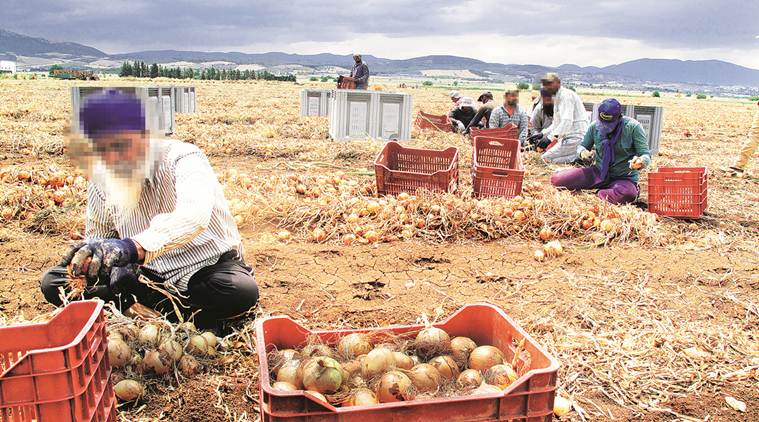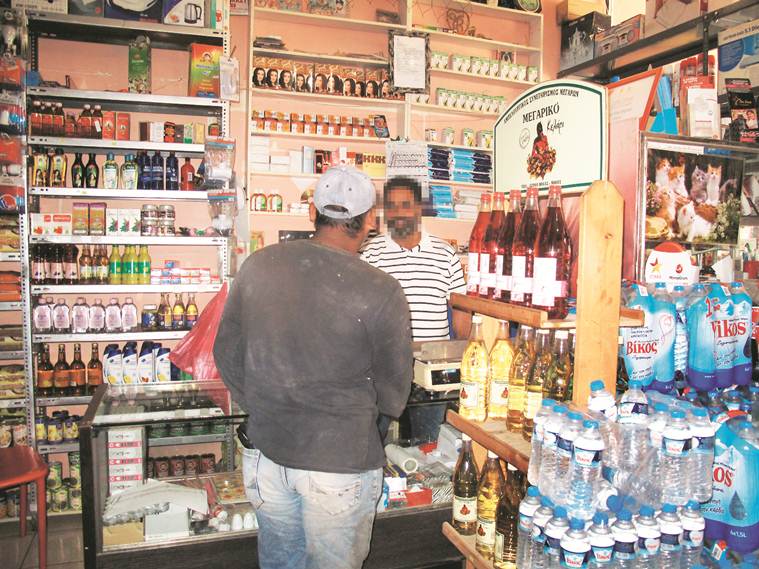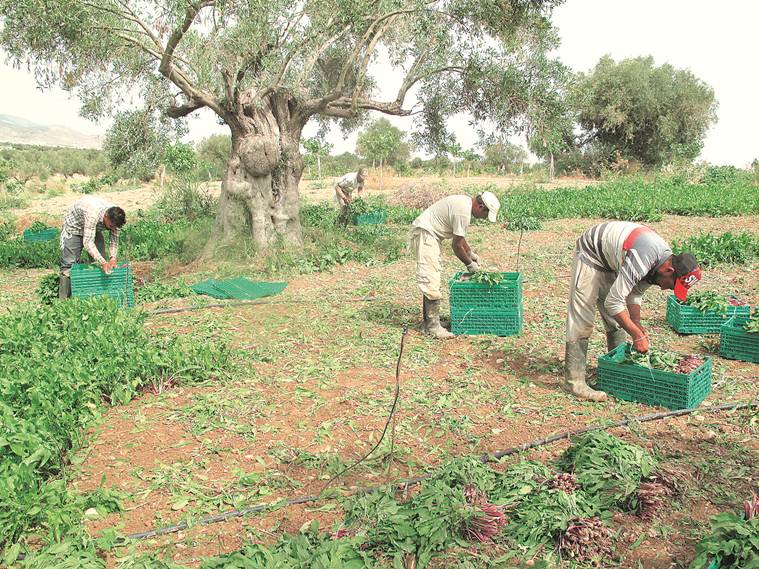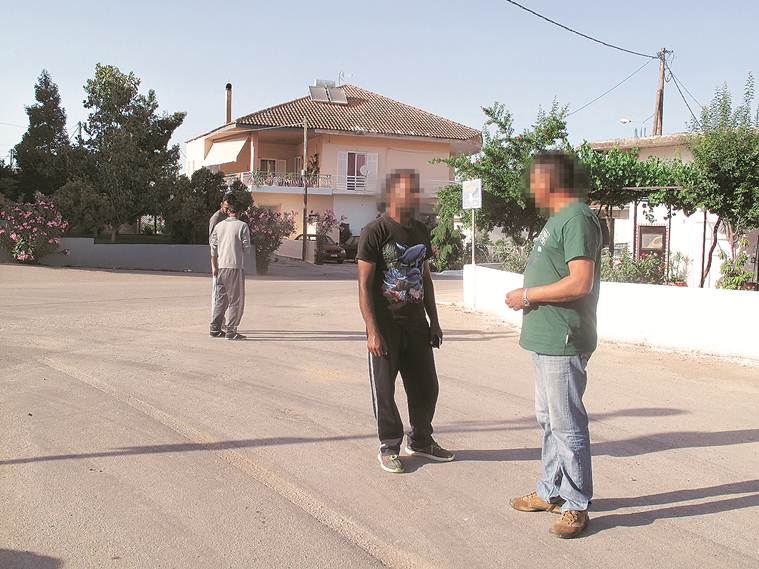 Indian migrants to Thiva and to the port city of Megara, nearly 68 km away, are almost all men and overwhelmingly from Punjab, a trend echoed in other parts of Greece.
Indian migrants to Thiva and to the port city of Megara, nearly 68 km away, are almost all men and overwhelmingly from Punjab, a trend echoed in other parts of Greece.
Scaled down to a speck in the vastness of the onion fields near Thiva, or Thebes as the Greek city was called in ancient times, Balbeer works all day, sitting on his haunches as he digs out onions. But as the sun goes down, he disappears, almost ceases to exist.
Barely out of his teens, Balbeer came to Thiva eight months ago. He is ‘paperan toh bina’ or without papers, as illegal Punjabi migrants in Greece are called. “Daddyji died when I was 12 years old. We used to be sharecroppers. Now, mother works on other people’s fields. I dropped out of school to work,” says the youngster from Batala in Gurdaspur district of Punjab.
“For uneducated young men like me, there is nothing back home to look forward to. Everyone around me said I should migrate to support my family. The agent said I would earn 650 Euros a month,” he says. At an exchange rate of Rs 85, that’s around Rs 55,000 a month — “I can’t imagine earning so much in India,” he adds.
 Inder Singh, who got regular status in 2006, now runs a grocery store in Megara
Inder Singh, who got regular status in 2006, now runs a grocery store in Megara
Indian migrants to Thiva and to the port city of Megara, nearly 68 km away, are almost all men and overwhelmingly from Punjab, a trend echoed in other parts of Greece. Almost all of them have entered the country illegally and, like Balbeer, are in their 20s, young and unmarried, poorly educated, unskilled or poorly skilled, and from low- or lower-middle class rural backgrounds. All have families back home whose survival depends heavily on the remittances they send.
Organised Indian migration to Greece started in the 1970s, when labour was needed in the country’s shipping and textile industries. Today, around 15,000-16,000 regularised Indian migrants live in the country while the number of those who are undocumented is estimated to be around 50,000.
These numbers are fluid as many of these migrants see Greece as a stopover before moving on to preferred European countries such as Italy or Germany. However, a big number ends up staying in Greece for years on end due to strict border controls.
***
The city of Thiva, 88 km from Athens, lies nestled in a picturesque plain, framed by the Cithareon mountains on its northern side. Labour-intensive crops such as onions, potatoes and carrots are grown in the fields surrounding the city. Gurmukh migrated here 10 months ago from a village near Batala in Gurdaspur.
 Migrant farmers in Megara
Migrant farmers in Megara
“I am here only for the sake of my children. I miss my family every moment. I am a Class 8 pass and so could not do much with my life, but I want to give my children a good education,” he says.
Gurmukh pulled his children out of the government school they went to – “the teachers would never come” – and enrolled them in a private school. Despite being a marginal farmer who supplemented his income by working on other people’s farms, he struggled to pay his children’s school fee.
It’s his dream for his children that led him to migrate to ‘Yunan’, as Greece is called in Punjabi. “The decision was sanjha (collective) – that I migrate for the betterment of the entire family,” he says.
At least a couple of families from his village had their men in Greece, and Gurmukh had seen their fortunes improve. So he contacted an ‘agent’ — as human smugglers are called — from a nearby village to help with the migration and left early 2017.
 The migrants live in ‘deras’, usually warehoues turned into living quarters
The migrants live in ‘deras’, usually warehoues turned into living quarters
Human smuggling is colloquially referred to as “donkey”. A term originally coined by migrant men from Mandi region of Punjab in Pakistan, it is now employed by all South Asian human smugglers and migrants to denote any migration that is illegal and one that involves overland travel across Pakistan, Iran, and Turkey, before crossing over into Greece.
A number of human smugglers facilitate the illegal movement of men from India to Greece via this Pakistan-Iran-Turkey route, a journey by foot and car that takes 30-40 days. The agents and smugglers are usually earlier migrants from Punjab who work in tandem with a series of Pakistani, Iranian, and Turkish human smugglers operating along this illegal migration route.
Greece is the first European Union country easily accessible both by sea and land (from neighbouring Turkey). The majority of migrants enter Greece from the north, where the river Evros forms a natural border between Greece and Turkey. It is relatively cheaper to migrate to Greece than to other European countries, costing approximately Rs 6-7 lakh each, an amount they usually raise as loans on exorbitant rates of interest.
“The most dangerous stretch is from Turkey into Greece. It is all mountainous. We walk only at night with no lights to show us the way. It is so dark that if you stretch out your hands, you cannot see them,” says Satwinder, 23, who works in a Megara farm.
One misstep here can bring the European dream crashing down. “The agents show no mercy if someone falls. They leave the injured person behind. When we were crossing over, one man fell off a cliff. We could hear him crying for help, but when asked the agent to stop, he prodded us all with sticks to keep on walking,” he says.
***
Megara town, 35 km west of Athens, is surrounded by undulating low hills dotted with olive groves. Once a port in the Gulf of Corinth with a thriving trade in wool, Megara is today a sleepy municipality that subsists on agriculture. The fertile red soil beneath the olive trees is used to grow horta or high-value ‘greens’ — parsley, dill, lettuce, dandelion, and amaranth, both for the domestic market and to export to other European countries.
With young, educated Greeks migrating to cities, the country’s agricultural economy is heavily dependent on the cheap labour of undocumented migrants from India, Bangladesh and Pakistan.
 Labour supervisor Arjan Singh (wearing green shirt) with a new migrant in Arma village near Thiva
Labour supervisor Arjan Singh (wearing green shirt) with a new migrant in Arma village near Thiva
Often, the Greek farmers elevate someone as a supervisor from among the workers, usually someone with a ‘regular’ immigrant status who can speak Greek.
Arjan Singh supervises 45 men. Over six feet tall, he is an arresting figure as he walks around the onion fields near a national highway, 3 km from Thiva. Men like him exercise authority over the more recent migrants, young men whose undocumented status makes them especially vulnerable to labour abuse and exploitation.
“I can get the new boys to fall in line. Unlike me, they are in a weaker position because they have no papers and are desperate for work,” Singh admits.
The new migrants usually work for three to four days a week. The daily wage for a work day of 10 hours, with one hour for lunch break, is 22-25 Euros, a rate that’s usually below the minimum wage of 27 Euros paid to the local Greeks.
Most migrants complain of delayed wages. “The Greeki (Greek farmer) pays me 100-120 Euros for a week’s work, but he owes me 4,300 Euros. I have been working for him for eight years. If I leave his farm now, I will lose all that money,” says Balwinder, who works on a farm in Megara.
“I am constantly worried — about the moneylender back home, the money I have to send for the family’s expenses… Here, we are bandhua majdoor (bonded labourers). We came here to escape such a life in Punjab, but now I am tied to the Greeki only because I am ‘paperless’,” says Harpreet, who is from a village in Patiala district.
Instances of revolt has been few and far between.
Two years ago, at a Megara farm, Pakistani workers had gone on strike to demand their dues. The farmer reached a settlement by partially paying the striking men. The downside: he dismissed them all from work.
Manwinder, hired as a replacement worker, says, “I dare not go on hartaal. Paperless men like me who have just arrived are desperate. We will even work for 18-20 Euros a day.”
Inder Singh, who runs a grocery store in Megara, came to Greece in 2002 through the infamous ‘donkey’ route, leaving behind his family in Gurdaspur. For four years, he worked odd jobs, mowing lawns, painting, and loading sacks of grain onto trucks. In 2006, when Greece last announced an amnesty for undocumented migrants, Inder Singh filed his papers for a regular status in Greece. “It is thanks to wahe Guruji that I was able to leave the tag of being undocumented,” he says.
Sitting in his store that’s stocked with dal, spices and other reminders of home that the migrants long for, Singh says, “The Greeks tolerate migrants only because they need cheap labour. There is always a distance from us. Kaam kiya, chutti. The worker should only be seen in the fields; not on the streets.”
Travelling around the region, it’s soon obvious what Singh is referring to. During the day, while the migrants are visible in the rural landscape, mostly as agricultural workers, come evening, they disappear.
The disciplinary mechanism of the landowners, exercised through the threat of arrests and deportations, forces the men to confine themselves to their living quarters.
Called “deras” in Megara and “stores” in Thiva, these makeshift housings are often warehoues turned into living quarters. Each dera in Megara has at least 6-10 men whereas in Thiva, 20-30 men live in each of these cavernous stores.
“We go to the farm, work, and then come back to the dera. This has been the story of my life here for 12 years,” says Birinder, an undocumented worker who spends his evenings talking to his family on the phone or watching Punjabi shows. “If we go out for a stroll, police come and arrest us. It happened to two men, who were then deported. It is better that we stay inside the dera,” says Amanjot, another worker.
***
Spraying units, rototillers, and other farm implements lie out in the open at a dera in Megara that houses 12 workers. Inside, mud-caked gumboots line up against one of the walls, a pile of worn-out pants hang on a row of nails, and upturned plastic crates function as shelves. The dera’s makeshift kitchen has a stove, a decrepit fridge, and a plastic table.
In one of the two rooms, separated by a thin plyboard, are two men running high fever. Sitting up on their folding camp cots, they offer, “Roti-cha tey chak lo (have tea and roti with us).” In the room is a makeshift shrine with portraits of Guru Nanak and other Sikh gurus.
The men, their lives lonely and uncertain, often they turn to gurdwaras to seek solace. The gurdwara in Megara, a short distance from the town and built with the labour and contributions of migrant Sikh workers, is usually packed on Sundays during ardas and langar.
The men, however, often hide their troubles from their families. Rab Nawaz, a Pakistani-origin regularised migrant, owns a shop in Megara, where he sells phone cards, transistors and room heaters.
“These men often come and ask me, ‘Uncleji, can we sit on your chair for a minute to take a photo?’ They do not want their families to know that they lead such harsh lives.”
The result: unrealistic expectations.
“We are ATMs for our families. Love depends on how much money we send home,” says Manjit, who migrated here nine years ago. “At the end of the day, after deducting living expenses, we are left with 300-350 Euros to send back home each month. If the farmer holds back our wages, it becomes difficult to send even that. Our family members then nag us, saying ‘distance has made you forget your loved ones’. They think that we squander our wages. If only they knew.”
With the last regularisation of undocumented migrants occurring in 2006, men who have been here since then stand little chance of reunifying with their families.
“Without papers, we are in a limbo – can’t earn a decent wage nor return to our families,” says Harwinder, 29, in the Megara dera. “Life is not good here. If I had known this, I would have stayed back in India. At least I wouldn’t have been this lonely.”
“I now want to return to my village. But I cannot think of doing it. People will taunt me, call me a failed man. Even my family won’t spare me,” he adds.
Sampooran Singh, a man in his early fifties, has long reconciled to his status. At a farm in Thiva, he sits on his haunches for 9-10 hours a day, pulling onions out from the soil. “I left home when my children were a few years old. Now they are of marriageable age. Only those with regular status can think of applying for Family Reunification. The rest, paperless like me, keep yearning (tarasde reh jaande han) to meet our families just once in this lifetime.”
All names are pseudonyms in compliance with protocols for safety of undocumented migrants